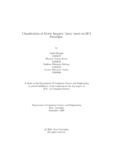Classi fication of motor imagery tasks based on BCI paradigm
Abstract
Motor imagery tasks are mental processes by which individual practices a set of
actions in their mind without actually performing the physical movements. Research
in the motor imagery tasks allow us to acquire critical information on how
the human brain works, which further enables us to integrate the knowledge with
brain-computer interface (BCI) technologies to improve neurological rehabilitation
along with, commercial uses such as communication, entertainment, etc. Electroencephalogram
(EEG) is a commonly used process to observe and classify brain activities.
However, EEG signal is non-stationary in nature, therefore, feature extraction
based on EEG signals is quite hard. In our thesis, empirical mode decomposition
(EMD) was used to break down the original signal into intrinsic mode functions
(IMFs) in order of higher frequency to lower frequency. Convolution neural network
(CNN) is then used on IMFs' feature vector and classify di erent motor imagery
tasks. Our proposed model achieves around 78% accuracy, where the dataset was
captured from nine participants.

